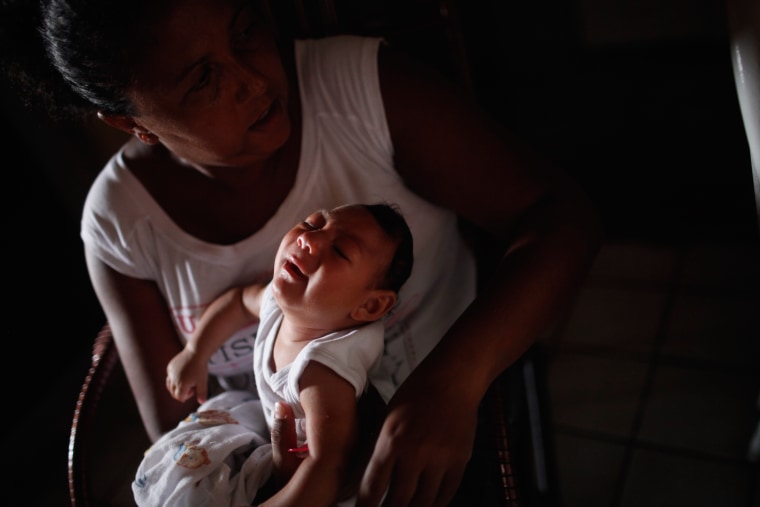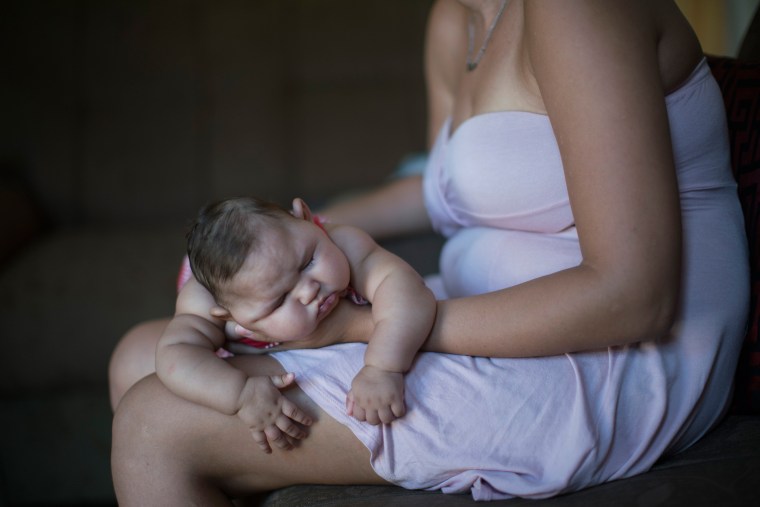How much does Zika virus infection raise the risk of birth defects? Are women who have Zika symptoms more likely to have babies with birth defects than women who don’t have symptoms?
U.S. and international researchers said Tuesday they’re launching a large, organized study to answer these questions and others about Zika, which is spreading fast across the Americas. They’re planning to follow 10,000 pregnant women from the very beginnings of pregnancy through to birth to see just how the virus affects their developing babies.

The Centers for Disease Control and Prevention and the World Health Organization both say there’s no doubt Zika causes birth defects, including the obvious injuries such as microcephaly, marked by brain damage that results in a small, deformed head.
It’s also clear that early pregnancy is a time of special risk, because Zika targets growing nerve cells.
What’s not known? A lot. Is the first trimester the most dangerous time? Are there other birth defects no one has noticed yet? Could there be special dangers for women in Brazil, Colombia and other places where the birth defects are seen most?
Related: Can I Ever Get Pregnant? And Other Zika Questions
“A mother’s environment may be an important part of the Zika virus puzzle,” said Linda Birnbaum, director of the National Institute for Environmental Health Sciences, one of the institutes taking part in the study.
“We’ve included environmental measures in the study and will also be evaluating nutrition and socio-economic status.”
"We cannot continue or finish the study unless we get additional money from Congress."
Some experts have wondered whether the mostly poor women in Brazil’s hard-hit northeast may be especially vulnerable, perhaps because of nutritional deficiencies .
Another question: does infection with other viruses or bacteria affect a pregnancy? Dengue virus is also circulating in the areas hardest hit by Zika. It’s a close relative of Zika and carried by the same mosquitoes.
A handful of women from the U.S. and Europe who traveled to Zika-affected areas have had babies or pregnancies affected by Zika infection. But they’d all spent time in these areas. What’s not known is whether women infected in different regions and more developed countries may have different patterns of birth defects.
Related: Zika Could Infect Thousands of Pregnant Women in Puerto Rico
“The study aims to recruit approximately 10,000 pregnant women ages 15 years and older in their first trimester of pregnancy at sites across Latin America and the Caribbean where active, local transmission of Zika virus is occurring,” the National Institutes of Health, which is sponsoring the study, said in a statement.
The study is being started with $500 million the Obama administration has shifted from other health programs, said Dr. Tony Fauci, head of the National Institute of Allergy and Infectious Diseases (NIAID).
"However, we cannot continue or finish the study unless we get additional money from Congress which we have requested," Fauci told NBC News. Obama asked for $1.9 billion to study and fight Zika, but Congress has not appropriated the money.
Zika’s a mystifying virus. It’s been known about since 1947, but was considered of no consequence because it did not seem to really affect people at all. Most didn’t even get symptoms when they were infected.
Related: Company Gets OK To Test Zika Vaccine
Later research suggests that four out of five people infected don’t have symptoms or only have mild symptoms. But some get a serious rash and feel very ill. The study will check to see whether women who have symptoms are more likely to have a baby with birth defects.
“Additionally, the study will evaluate how the timing of infection affects pregnancy outcomes,” NIH said.
So far, much of what’s known about how Zika affects women relies on their memories of symptoms during pregnancy. Following women throughout their pregnancies is a better way of seeing and recording just what happens.
And, as with any disease, doctors know the most about people who show up looking for treatment. They rarely or never hear about people with infections who don’t get sick or don’t seek treatment. It’s possible that many pregnant women who were infected with Zika had healthy babies later — a finding that would be reassuring.
"Within 9 months from now ... pediatricians working in poor urban areas of the Americas where Zika virus is now emerging can expect to see babies with microcephaly and the full-blown fetal brain disruption sequence."
But it will take organized study to find out what percentage of women that might be.
Related: Did Zika Cost This Woman Her Baby?
“The women participants will be monitored monthly for the duration of their pregnancies and then at six weeks after they give birth. They will receive a physical examination and be asked to provide blood, urine, saliva and vaginal swab samples at study entry and at each monthly prenatal care visit,” the NIH said.
“Post-delivery, a breast milk sample, if available, will be obtained for Zika testing. Infants whose mothers consent to their participation in the study will be evaluated within 48 hours of birth and then again at three, six and 12 months.”
It's of huge interest in countries now affected by Zika — there are 60, according to WHO. But experts also predict local outbreaks in the U.S. as mosquito season gets going and Zika-infected travelers pass the virus to the biting insects.
"Within 9 months from now — by the end of 2016 and into early 2017— pediatricians working in poor urban areas of the Americas (including the U.S. Gulf Coast) where Zika virus is now emerging can expect to see babies with microcephaly and the full-blown fetal brain disruption sequence," predicted Dr. Peter Hotez, dean of tropical medicine at the Baylor College of Medicine.

